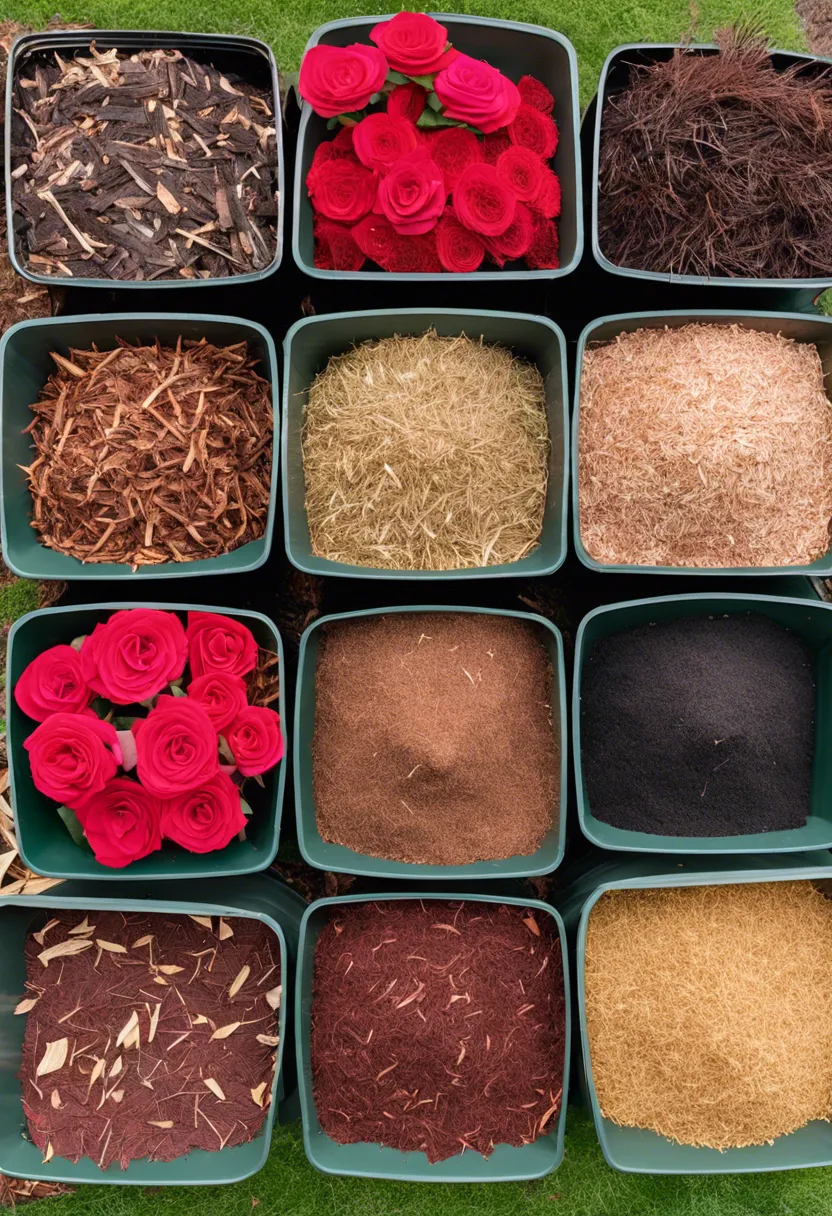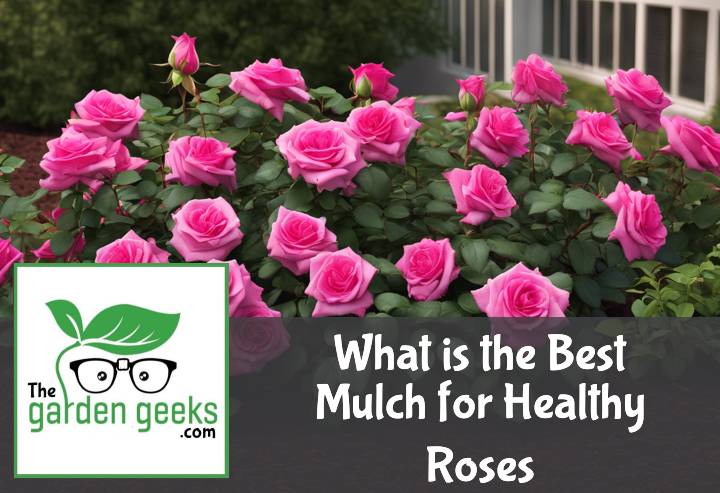Did you know that the Best Mulch for Healthy Roses can make a world of difference in your garden’s overall health and appearance? Yes, it’s true! The right mulch can be a game-changer for your roses.
Mulching is not just about making your garden look neat and tidy. It plays a crucial role in maintaining the vitality of your roses. This simple gardening technique can help improve soil quality, conserve water, and protect your precious roses from harsh weather conditions.
So, if you’re looking to give your roses the best care possible, choosing the right mulch should be at the top of your list. Keep reading about Best Mulch for Healthy Roses to discover how this easy step can transform your rose garden into a blooming paradise.
Quick Answer
- Organic mulches like compost, shredded bark, and pine needles are best for roses as they improve soil health and retain moisture.
- Inorganic mulches, such as stones or rubber, can be used but don’t enrich the soil.
- Choosing the right mulch depends on your local climate, soil type, and specific rose variety.
- Proper application involves placing a 2-3 inch layer of mulch around the base of the roses without touching the stems.
- Watch out for signs of improper mulching like waterlogged soil or pest infestations.

Why is Mulch Important for Roses?
Mulching is like giving your roses a cozy blanket. It’s super important because it helps keep them happy and healthy. When you mulch, you’re doing a bunch of good stuff for your rose gardening adventure. But, watch out! Sometimes people mess up by either piling on too much or picking the wrong kind of mulch. We’ll dive into those common mulching errors soon, but remember, doing it right means you’re on the path to having some seriously healthy roses.
Benefits of Mulching Roses
First off, let’s talk about why mulch is pretty much a superhero for your roses. One big win is moisture retention. Think of mulch as a moisture keeper-outer during hot days and a moisture keeper-inner when it’s dry. This means your roses won’t get thirsty as quickly, which is awesome.
Next up, we’ve got weed control. Nobody likes weeds, right? They’re like the uninvited guests at a party. Mulch helps keep those party crashers away from your rose garden. It covers the soil so weeds can’t get enough light to grow.
Lastly, let’s chat about temperature regulation in roses. Mulch keeps the soil temperature steady by making sure it doesn’t get too hot or too cold. This means your roses feel just right all year round.
Common Mistakes When Mulching Roses
Now onto the oopsies people make with mulching. A big no-no is piling mulch too high around the base of your rose plants. This can lead to soggy stems and unhappy flowers.
Another mistake is choosing the wrong type of mulch for roses. Some types can be too heavy or not breathable enough, which isn’t great for those delicate roots.
And don’t forget about putting down mulch at the wrong time! Timing matters because if you do it too early or too late in the season, it won’t help much with those benefits we talked about earlier.
So there you have it! Keep these tips and tricks in mind when mulching your roses to avoid common pitfalls and ensure they stay healthy and beautiful.
What Types of Mulch are Best for Roses?
Choosing the right type of mulch is crucial for rose gardening tips. We’ll dive into organic and inorganic mulches to see what works best.
Organic Mulches
Organic mulches are like a cozy blanket for your roses. They come from natural stuff like leaves, wood chips, or compost. Why are they awesome? Well, they feed your roses by breaking down over time. This means your rose soil health gets a big boost without you doing much.
One cool type of organic mulch is shredded bark. It looks neat and tidy while keeping your roses happy. Another hero in the organic world is compost. It’s like a superfood for your plants, packed with nutrients.
But here’s the thing, not all organic mulches are created equal. Straw might seem like a good idea because it’s cheap, but it can invite unwanted guests like pests and mold. So, choosing wisely is key to maintaining healthy roses.
Inorganic Mulches
Now, let’s talk about the other side of the coin – inorganic mulches. These are things that don’t come from living materials. Think rocks or rubber chips. They have their perks too! For one, they don’t break down so you’re not re-mulching every year.
Rocks can make your rose bed look sharp and keep weeds at bay. But beware; they can also heat up too much under the sun and stress out your roses. That’s not exactly ideal for maintaining rose beds with inorganic mulch.
Another option is rubber mulch which stays put even when it’s windy. However, it doesn’t add any nutrients to the soil since it doesn’t break down. So you might end up needing to feed your roses more than you’d like.
In short, inorganic mulches have their place but remember, they won’t help improve your soil over time. It’s all about what matters most to you: less maintenance or boosting soil health?



How to Choose the Right Mulch for Your Rose Garden


Choosing the right mulch is like picking the perfect outfit for your roses. It’s all about matching the rose garden mulching needs with what each type of mulch offers.
Factors to Consider When Selecting Mulch
When diving into the world of mulching, think about your soil’s feelings first. Healthy soil equals happy roses. If your soil could talk, it would ask for a mulch that helps it stay moist and nutritious.
Next up, let’s chat about the weather. If you’re living where it’s hot enough to fry an egg on the sidewalk, your roses will need a mulch that keeps them cool. On the flip side, in cooler spots, a warmer blanket of mulch can keep roots cozy.
Pests are like those uninvited guests at a party. Some types of mulch can tell pests to buzz off, making them super heroes in your rose garden.
Comparing Different Types of Mulch for Roses
Organic mulches are like home-cooked meals for your roses – full of nutrients and love. They break down over time, feeding the soil and keeping moisture in check. Think wood chips or compost; they’re like comfort food for plants.
But hey, not all organic options are perfect. Sometimes they attract unwanted guests like insects or mold. It’s like having too much of a good thing.
Inorganic mulches don’t feed the soil but they’re great at keeping weeds away and moisture in. Rocks or rubber might not offer snacks for your plants, but they do dress up your garden with less maintenance.
However, these shiny inorganics can sometimes be too hot to handle under the sun, heating up more than an organic choice would. Plus, they won’t give back to the soil when their job is done.
Choosing between organic and inorganic is like deciding if you want comfort or convenience. Both have their perks depending on what your rose garden craves most.
How to Properly Apply Mulch to Rose Gardens
Applying mulch to your rose garden is like tucking your plants in with a cozy blanket that keeps them comfy through all kinds of weather. But just throwing a blanket on the bed doesn’t make it look or feel good, right? You’ve got to do it properly. Let’s walk through the steps to ensure your roses get all the benefits of mulching without any downsides.
-
Choose the right mulch for your roses. Not all mulches are created equal when it comes to rose gardens. Organic mulches like shredded bark, cocoa bean shells, or well-rotted compost are fantastic because they improve soil health as they break down. Avoid using rubber or synthetic mulches as they don’t offer the same benefits.
-
Prepare the garden bed before you lay down any mulch. This means pulling out weeds and removing any old, diseased leaves or petals that might be lying around. These can harbor pests and diseases, which we definitely don’t want in our freshly mulched bed.
-
Water your roses thoroughly if the soil is dry. Mulching over dry soil can trap heat and stress out your plants even more during hot weather. Giving them a good drink first ensures they’re hydrated and happy under their new blanket.
-
Apply the mulch evenly, starting from about an inch away from the base of each rose bush and spreading outwards to cover the entire bed. The key here is not piling it up against the stems, which can cause rot and invite pests.
-
Aim for a depth of 2-3 inches of mulch around your roses. Too little won’t retain moisture or suppress weeds effectively, while too much can suffocate plant roots and prevent air from circulating properly.
-
Water again lightly after applying the mulch to help settle it into place and ensure that moisture reaches the soil beneath immediately.
By following these steps, you’ll create an environment where your roses can thrive, protected from extreme temperatures, weed competition, and moisture loss. Plus, as organic mulches break down over time, they feed your soil and improve its structure, making it a win-win for both you and your garden!
Signs and Solutions for Issues Related to Improper Mulching
| Signs of Improper Mulching | Possible Causes | Recommended Solutions |
|---|---|---|
| Yellowing leaves | Over-mulching | Reduce mulch layer to 2-3 inches |
| Wilting plants | Poor water penetration due to compacted mulch | Loosen the mulch with a garden fork |
| Slow plant growth | Nutrient deficiency from wood-based mulches | Add a nitrogen-rich fertilizer |
| Mold or fungus on mulch | Too much moisture trapped in the mulch layer | Spread out the mulch to let it dry, or replace if necessary |
| Pests like slugs or beetles | Mulch providing shelter for pests | Use pest-resistant types of mulch, such as cedar bark |
| Plant disease | Disease organisms harbored in organic mulches | Replace with fresh, disease-free mulch |
| Root rot | Excessive moisture due to over-mulching | Ensure proper drainage and don’t over-water |


To Wrap Up
So, you’ve learned a lot about the Best Mulch for Healthy Roses. Remember, organic mulches like compost and wood chips are great for your roses. They help keep the soil moist and enrich it with nutrients.
Don’t forget about cocoa shells and straw! They’re not just pretty to look at but also help in keeping those pesky weeds away.
Finally, always remember that choosing the right mulch can make your roses healthier and more beautiful. So, don’t wait up! Get your perfect mulch today and let your roses bloom!
What are the different types of organic mulches suitable for roses?
Composted bark, wood chips, straw, and leaf mold are among the various types of organic mulches that can be used for roses. They improve soil structure and fertility as they decompose.
Are there any specific inorganic mulches recommended for rose plants?
Gravel and pebbles are common inorganic mulches used for roses. They don’t improve soil fertility like organic ones but do a great job at conserving moisture and preventing weed growth.
How often should I replace or replenish the mulch in my rose garden?
Typically, you should refresh your mulch once a year. However, this can vary depending on the type of mulch used and local weather conditions.
Is it possible to use too much mulch on roses?
Yes, using too much mulch can lead to waterlogging and root rot. Generally, a 2-3 inch layer of mulch is sufficient for most rose gardens.
Can improper mulching cause disease in rose plants?
Improperly applied or inappropriate types of mulch may harbor pests or diseases, negatively affecting your roses. Therefore, choosing and applying the right kind of mulch is crucial.
Is it necessary to remove old mulch before adding new one?
It’s not always necessary to remove old mulch before adding new one unless it’s diseased or infested with pests. If healthy, old mulch can be mixed into the soil to improve its quality.


